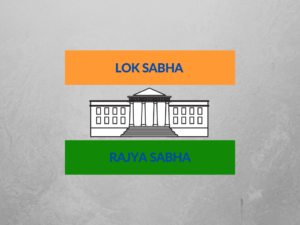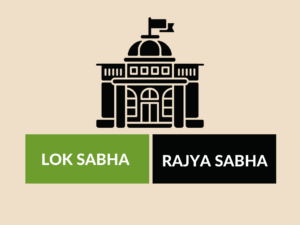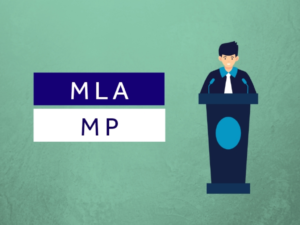What is Lok Sabha?
Lok Sabha is the lower house of the Parliament of India. It is composed of members directly elected by the Indian citizens through universal adult suffrage. The Lok Sabha has the power to make laws and control the finances of the Indian government. It plays a crucial role in the legislative process and represents the interests of the people.
Examples of Lok Sabha:
- The Indian Parliament consists of Lok Sabha and Rajya Sabha, with Lok Sabha being the lower house.
- The Lok Sabha comprises 545 members, including 543 elected representatives from constituencies across India, and two members nominated by the President of India.
- The Speaker of the Lok Sabha presides over its sessions and ensures the orderly conduct of business.
Uses of Lok Sabha:
The Lok Sabha serves several important functions:
- Legislative Power: Lok Sabha has the primary responsibility of making laws for the country.
- Budgetary Control: It reviews and approves the budget proposed by the government.
- Executive Control: The Lok Sabha holds the government accountable and exercises control over the executive.
- Representation: It represents the interests of the people and provides a platform for their concerns to be addressed.
- Decision Making: The Lok Sabha plays a crucial role in decision-making, especially with regard to major policy matters.
What is Vidhan Sabha?
Vidhan Sabha, also known as the Legislative Assembly, is the lower house or the sole house of a state legislature in the states and union territories of India. It is responsible for enacting laws and regulations at the state level. Each state has its own Vidhan Sabha with varying numbers of members based on the population of the state.
Examples of Vidhan Sabha:
- The Vidhan Sabha is the legislative assembly in the state of Maharashtra.
- Each Vidhan Sabha consists of members directly elected by the eligible voters of the state.
- The Speaker of the Vidhan Sabha presides over its sessions and maintains order during debates and discussions.
Uses of Vidhan Sabha:
The Vidhan Sabha serves several purposes:
- State Legislation: It is responsible for making laws and regulations at the state level.
- Executive Control: Vidhan Sabha exercises control over the executive branch of the state government.
- Representation: It represents the interests of the people of the respective state.
- Budgetary Control: The Vidhan Sabha reviews and approves the state budget.
- Accountability: It holds the state government accountable for its actions and decisions.
Differences between Lok Sabha and Vidhan Sabha:
| Difference Area | Lok Sabha | Vidhan Sabha |
|---|---|---|
| Composition | The Lok Sabha is composed of members elected by citizens of India. | The Vidhan Sabha is composed of members elected by citizens of a specific state. |
| Number of Members | The Lok Sabha consists of 543 elected members and 2 nominated members. | The number of members in each Vidhan Sabha varies based on the population of the state. |
| Legislative Jurisdiction | Lok Sabha has the power to enact laws at the national level. | Vidhan Sabha has the power to enact laws at the state level. |
| Sessions | Lok Sabha holds its sessions in the Parliament House in New Delhi. | Vidhan Sabha holds its sessions in the respective state capitals. |
| Presiding Officer | The Speaker is the presiding officer of Lok Sabha. | The Speaker is the presiding officer of Vidhan Sabha. |
| Election Frequency | Elections for Lok Sabha are held every five years. | Elections for Vidhan Sabha are held every five years or as per the dissolution of the assembly. |
| Representation | Lok Sabha represents the entire country and its diverse population. | Vidhan Sabha represents the people of a specific state. |
| Law Making Authority | Lok Sabha has the authority to make laws on matters under the Union List and Concurrent List. | Vidhan Sabha can make laws on matters under the State List and Concurrent List. |
| Budget Approval | Lok Sabha reviews and approves the national budget. | Vidhan Sabha reviews and approves the state budget. |
| Legislative Control | Lok Sabha exercises control over the central government. | Vidhan Sabha exercises control over the state government. |
Conclusion:
In conclusion, Lok Sabha and Vidhan Sabha are two distinct legislative bodies in India. While Lok Sabha represents the country as a whole and deals with national legislation, Vidhan Sabha represents individual states and focuses on state-level legislation. Their composition, legislative authority, jurisdiction, and powers differ significantly. These bodies play vital roles in lawmaking, budgetary control, and executive oversight.
People Also Ask:
- What is the role of Lok Sabha in the Indian political system?
The Lok Sabha has the primary responsibility of making laws, controlling finances, and exercising executive control over the government. It represents the interests of the people and plays a crucial role in decision-making. - What is the purpose of Vidhan Sabha?
The Vidhan Sabha is responsible for enacting laws and regulations at the state level. It represents the people of a specific state, exercises control over the state government, and holds it accountable for its actions. - How often are elections held for Lok Sabha?
Elections for Lok Sabha are held every five years, unless dissolved earlier. The citizens of India elect their representatives through a democratic voting process. - Who is the presiding officer of Lok Sabha?
The Speaker of the Lok Sabha is the presiding officer. The Speaker maintains decorum, decides on points of order, and ensures a smooth conduct of business in the house. - Can a member be a part of both Lok Sabha and Vidhan Sabha simultaneously?
No, a member cannot simultaneously be a part of both Lok Sabha and Vidhan Sabha. If a person contests and wins elections for both houses, they must choose and resign from one house within the prescribed time limit.




